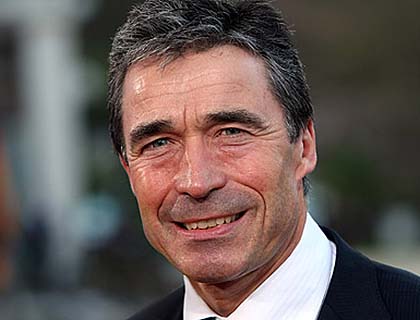An Exclusive Interview with NATO Secretary General Anders Fogh Rasmussen
NATO is working with the Afghan government on implementing the agreement on an enduring partnership, the secretary-general said on Thursday, pledging continued international assistance to the war-battered country."We know that individual allies are working with the Afghan government as well and some bilatf all it's important to stress that the fact that we will establish such a training mission demonstrates our continued commitment to Afghanistan. By the end of 2014 our current ISAF combat mission will end. The new mission that will start in 2015 will not be a combat mission. It will be as you said, a training, advice and assist mission, but it demonstrates a continued commitment. We will be here and train and assist and give advice to the Afghan Security Forces. What it entails in detail will of course also be discussed with the Afghan Security Forces. What is needed — we will continue training activities when needed, we will give advice how to conduce security operations, and assistance, that's of course also a question of helping Afghan Security Forces to plan security operations. It is important to stress that our training mission after 2014 will not be a combat mission. Combat will be for the Afghan Security Forces.
Q: The Afghan security forces need a strong air force, but what do you think after 2014. They do not have a lot of aircraft and air equipment? Can they do combat operations?
A: It's our intention to make sure that the Afghan Security Forces will be able to take full responsibility for the security in Afghanistan after 2014. NATO Allies are already working with the Afghan Security Forces to provide needed military equipment. In that respect, it's also important to include training activities to make sure that the Afghan Security Forces are capable to manage such, sometimes sophisticated, military equipment. So it's an ongoing process that we continue until the end of 2014. It's clearly our intention to make sure that the Afghan Security Forces will be fully capable to take full responsibility for all over Afghanistan by the end of 2014.
Q: After 2014 when Afghan Security Forces start combat operations by themselves, if they ask ISAF for air support on an operation, will ISAF do this?
A: That's a very hypothetical question. As a point of departure, combat operations will be conducted by the Afghan Security Forces on their own. We will be there to train, and give advice, and assist. Our mission will not be a combat mission.
Q: At the Lisbon Conference, NATO and Afghanistan agreed for a strategic enduring partnership. Has there been any progress on this?
A: We are still working with the Afghan government to implement the agreement on an Enduring Partnership. We know that individual Allies are working with the Afghan Government as well and some bilateral strategic partnership agreements have already been concluded between the Afghan Government and individual NATO Allies. But we are also working as an organisation with the Afghan Government to implement the Enduring Partnership and that Enduring Partnership is also a testament to our continued commitment to Afghanistan. We would like to see a well developed partnership between NATO and Afghanistan also after 2014.
Q: So is there an exact time how long it will take? One year? Two years?
A: We have already signed the Enduring Partnership agreement. Now it's a question of implementing it.
Q: Last month there was a report from the International Crisis Group. Most Afghans fear that after 2014 there will be a political, military and economic crisis. What is your clear messages to Afghans that they should be satisfied that there will be no crisis and no civil war?
A: My clear message is that the whole international community will stay committed to helping Afghanistan in the future. I think that's the main weakness of this report from the International Crisis Group, that this report doesn't take into account that the international community during a series of conferences, international conferences, has pledged to promote a positive economic and social development in Afghanistan. Let me remind you of the conferences in Bonn, in Kabul, in Tokyo. At these conferences the international community has discussed how can we promote a positive development in Afghanistan? So our goal is that Afghanistan will be able to stand on its own feet, but Afghanistan will not stand alone. The international community will continue to help Afghanistan, also after 2014.

